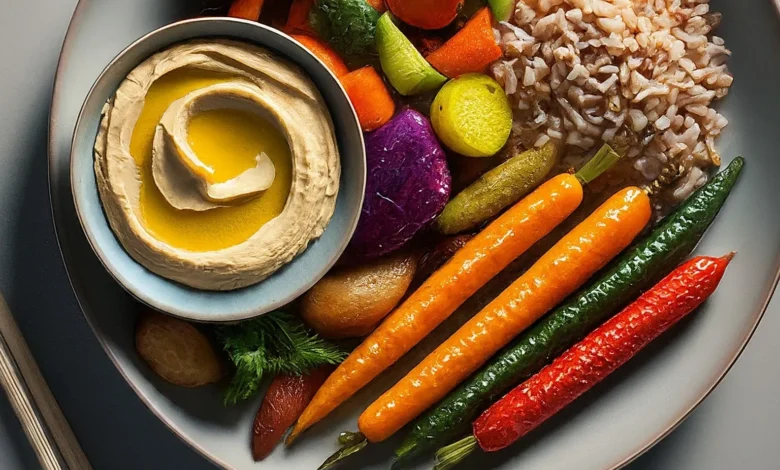Mindful Eating: Transform Your Food Relationship

Introduction
Have you ever finished a meal without really tasting it? Or found yourself snacking mindlessly while watching TV? If so, you’re not alone. Many of us eat on autopilot, disconnected from our food and our body’s signals. But there’s a better way: mindful eating.
Mindful eating is a powerful approach that can change how you think about food and eating. It’s not a diet, but a skill that can help you enjoy your meals more, manage your weight better, and improve your overall well-being.
In this post, we’ll explore what mindful eating is, why it matters, and how you can use it to transform your relationship with food. Get ready to discover simple yet effective skills that can make a big difference in your life!
Understanding Mindful Eating
What is Mindful Eating?
Mindful eating is about paying full attention to your food and the experience of eating. It’s based on mindfulness, an ancient practice that helps you focus on the present moment.
When you eat mindfully, you:
- Notice the colors, smells, flavors, and textures of your food
- Eat slowly and without distraction
- Listen to your body’s hunger and fullness signals
- Think about where your food comes from
How is Mindful Eating Different from Dieting?
Mindful eating is not a diet. Here’s how they differ:
- Diets focus on what and how much you eat. Mindful eating focuses on how you eat.
- Diets often have strict rules. Mindful eating is flexible and personal.
- Diets can make you feel deprived. Mindful eating helps you enjoy food more.
- Diets are often short-term. Mindful eating is a lifelong skill.
The Mind-Body Connection in Eating Habits
Your mind and body are closely linked when it comes to eating. Stress, emotions, and thoughts can all affect your eating habits. Mindful eating helps you tune into these connections.
For example, you might notice that you eat faster when you’re stressed. Or that certain foods make you feel sluggish. By paying attention to these patterns, you can make choices that feel better for your body and mind.
The Benefits of Mindful Eating
Mindful eating isn’t just about changing how you eat. It can have wide-ranging benefits for your health and well-being. Let’s look at some key advantages:
- Improved digestion: When you eat slowly and chew thoroughly, your body can digest food better.
- Better portion control: By tuning into your body’s signals, you’re less likely to overeat.
- Weight management: Mindful eating can help you reach and maintain a healthy weight without strict dieting.
- Reduced emotional eating: You’ll learn to tell the difference between emotional and physical hunger.
- Less food-related stress: No more guilt about eating “bad” foods. You’ll develop a more balanced approach.
- More enjoyment from meals: When you pay attention to your food, you’ll appreciate its flavors more.
- Better nutrition: You might make healthier food choices when you’re more aware of how food affects you.
These benefits show why mindful eating is more than just a trend. It’s a valuable skill that can improve your overall relationship with food and eating.
Core Skills for Mindful Eating
Let’s explore the key skills that can help you become a more mindful eater. These techniques are simple, but they take practice to master.
Eating with Awareness
Eating with awareness means fully focusing on your food and the act of eating. Here’s how to do it:
- Use your senses: Before you start eating, take a moment to look at your food. Notice its colors and textures. Smell it. As you eat, pay attention to the taste and how it feels in your mouth.
- Listen to your body: Check in with yourself before, during, and after meals. Ask:
- Am I actually hungry?
- How full am I feeling?
- What is my body craving?
Practical tip: Start with one mindful bite at the beginning of each meal. Gradually increase the number of mindful bites as you get more comfortable.
Slowing Down
Eating slowly gives your body time to send fullness signals to your brain. It also helps you enjoy your food more. Try these techniques:
- Put your fork down between bites
- Chew each mouthful at least 20 times
- Take sips of water between bites
- Try using chopsticks or your non-dominant hand to slow yourself down
Remember: It takes about 20 minutes for your brain to register that you’re full. Slowing down gives you time to recognize when you’re satisfied.
Eliminating Distractions
Distractions can lead to mindless overeating. Create a dedicated eating environment by:
- Turning off the TV
- Putting away your phone
- Sitting at a table instead of eating on the go
- Avoiding working or reading while eating
Tip: If you can’t avoid all distractions, try to make at least one meal a day distraction-free.
Cultivating Gratitude for Food
Developing a positive relationship with food can enhance your mindful eating practice. Try these ideas:
- Think about where your food came from and who prepared it
- Take a moment to appreciate the nourishment your food provides
- If you enjoy cooking, savor the process of preparing your meals
Example: Before eating, take a deep breath and silently express gratitude for your meal. This simple act can help you approach eating with a more positive mindset.
Overcoming Common Challenges
Even with the best intentions, mindful eating can be challenging. Let’s address some common hurdles:
Q: How can I deal with emotional eating?
A: First, recognize that emotional eating happens. When you feel the urge to eat due to emotions:
- Pause and take a few deep breaths
- Ask yourself if you’re truly hungry or if you’re seeking comfort
- If it’s emotional, try addressing the feeling directly (e.g., call a friend, go for a walk)
Q: How do I navigate social eating situations?
A: Social events can be tricky for mindful eating. Try these strategies:
- Eat a small, healthy snack before the event to avoid arriving overly hungry
- Choose a smaller plate if it’s a buffet-style meal
- Engage in conversation between bites to naturally slow down your eating
Q: What about food cravings?
A: Cravings are normal. Here’s how to handle them mindfully:
- Acknowledge the craving without judgment
- Wait a few minutes to see if it passes
- If you decide to indulge, do so mindfully and without guilt
- Pay attention to how you feel after eating. This can inform future decisions
Remember, mindful eating is a practice. It’s okay to have moments of mindless eating. The goal is progress, not perfection.
Incorporating Mindful Eating into Daily Life
Adopting mindful eating habits doesn’t happen overnight. Here’s how you can gradually integrate these practices into your routine:
Starting Small: Mindful Eating Exercises for Beginners
The Raisin Exercise:
- Take a single raisin (or any small food item)
- Examine it closely, noticing its texture, color, and shape
- Smell it and notice any arising thoughts or reactions
- Place it in your mouth without chewing, noticing how it feels
- Slowly chew it, focusing on the taste and texture
- Swallow mindfully, tracking the sensation
Mindful Sips:
- Choose a beverage you enjoy
- Take a small sip and hold it in your mouth
- Notice the temperature, flavor, and texture
- Swallow slowly, feeling the liquid move down your throat
Tip: Practice these exercises for a few minutes each day to build your mindful eating skills.
Creating a Mindful Eating Routine
- Set aside time for meals: Schedule regular meal times to avoid rushed eating.
- Create a peaceful eating environment: Set the table nicely, even when eating alone.
- Start meals with a moment of gratitude: Take a deep breath and appreciate your food.
- Eat without screens: Turn off TVs, phones, and computers during meals.
- Check in with your hunger levels: Before, during, and after eating.
Mindful Grocery Shopping and Meal Planning
- Shop with a list: This helps avoid impulse buys and ensures you have healthy options at home.
- Choose whole foods: These often require more preparation, naturally slowing down your eating process.
- Plan your meals: This reduces stress around food choices and helps you make balanced decisions.
Remember: The goal is progress, not perfection. Incorporate these practices gradually and be patient with yourself.
The Role of Mindful Eating in Overall Wellness
Mindful eating isn’t just about food—it’s a pathway to overall well-being. Let’s explore its broader impacts:
| Aspect of Wellness | Impact of Mindful Eating |
|---|---|
| Mental Health | Reduces stress and anxiety around food choices |
| Physical Health | May help manage weight and improve digestion |
| Emotional Well-being | Enhances enjoyment of food and reduces guilt |
| Body Image | Promotes a more positive relationship with your body |
Connection to Mental Health and Stress Reduction
Mindful eating can help reduce stress by:
- Breaking the cycle of emotional eating
- Providing a moment of calm in a busy day
- Improving your overall relationship with food
Impact on Physical Health and Chronic Conditions
While not a cure-all, mindful eating may help manage:
- Diabetes: By improving blood sugar control through better food choices and portion awareness
- Digestive issues: By reducing overeating and promoting better chewing
- Heart health: By naturally steering towards healthier food choices
Enhancing Body Image and Self-Esteem
Mindful eating encourages you to:
- Listen to your body, rather than following strict external rules
- Enjoy food without guilt, improving your overall relationship with eating
- Appreciate your body for its abilities, not just its appearance
By focusing on the experience of eating rather than restrictive dieting, mindful eating can lead to a more positive body image and improved self-esteem.
Conclusion
Mindful eating is a powerful tool that can transform your relationship with food. By practicing the skills we’ve discussed, you can turn everyday meals into opportunities for greater health, satisfaction, and self-awareness.
Let’s recap the key mindful eating skills we’ve explored:
- Eating with awareness: Engaging all your senses in the eating experience
- Slowing down: Taking time to enjoy and appreciate your food
- Eliminating distractions: Creating a focused eating environment
- Cultivating gratitude: Developing a positive attitude towards food and nourishment
Remember, mindful eating isn’t about perfection. It’s about developing a more conscious, enjoyable, and healthy approach to eating. Every meal is a new opportunity to practice.
Your Mindful Eating Journey Starts Now
As you embark on your mindful eating journey, keep these tips in mind:
- Start small: Begin with one mindful meal or snack per day
- Be patient: Like any skill, mindful eating takes time to master
- Stay curious: Approach each meal as a new experience
- Be kind to yourself: There’s no “failing” at mindful eating – it’s all part of the learning process
By incorporating these practices into your daily life, you’re not just changing how you eat – you’re taking a significant step towards overall wellness. Mindful eating can lead to better physical health, reduced stress, improved body image, and a more positive relationship with food.
Take Action Today
Why not start your mindful eating journey right now? Choose one meal today to practice eating mindfully. Pay attention to the colors, smells, and tastes of your food. Notice how it feels to eat slowly and without distractions.
Remember, every bite is an opportunity to nourish your body and mind. By choosing to eat mindfully, you’re choosing to live more fully in the present moment.
Your journey to a healthier, happier relationship with food begins with your very next meal. Are you ready to take that first mindful bite?



